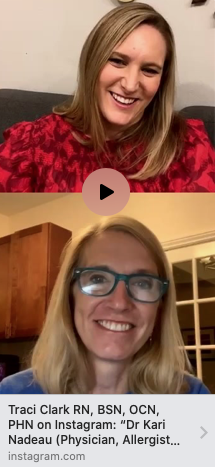MUST READ: Food Allergy Prevention and "Boosting" Baby's Immune System
Don’t fret if you missed it! You can hear Dr Nadeau’s interview with nurse and mom of two, Traci Clark here.
Join me on Instagram, where I share tips from home to health.
Dr Kari Nadeau (Stanford physician, allergist, immunologist, researcher, author, mother of FIVE and COMPLETE GODDESS) joined us to discuss her book, The End of Food Allergies. She shares how to strengthen your and your baby’s immune system and prevent food allergies. There is a powerful connection between what is in the air we breathe, the dog that shares our bed, the food we eat and our immune systems.
Did you know that research has shown that early introduction (between 4-11 months old) of peanuts can reduce a baby’s risk of developing a peanut allergy by 80%!? You can also implement the ‘5 D’s’ for your family to strengthen your immune systems (see below).
1 out of every 12 children and 1 in every 10 adult suffers from food allergies. And I really do mean ‘suffers.’ “Adults and children with food allergies live in a constant state of anxiety about their safety” (Dr. Kari Nadeau).
You can watch our interview here on Instagram.
You can listen to the interview here on the Podcast,
THE 5 D’s
“Now we have a wealth of evidence saying the “5 Ds” are helpful: Make sure your vitamin D levels are good; if you can, keep a dog while your kids are small; have good dirt around; avoid dry skin and strong detergents that are hard on the skin; and diversify the diet early” (5 Questions with Kari Nadeau).
Avoiding DRY SKIN is an important D to help keep a healthy immune system! More tips on how to avoid dry skin here, from Stanford dermatologist, Dr Lisa Zaba.
A Little More Info on the 5 D’s
Vitamin D: “Both too little and too much vitamin D are problematic” (End of Food Allergies). Should you supplement? See below!
Keep a Dog in your home, especially the first year. They can track in the right kind of dirt to build up our immune system.
Avoid Dry skin: Do not bathe every night and apply moisturizer from a TUB (like Eucerin, Cerave, Aquaphor) within THREE MINUTES of getting our of the bath shower if you struggle with eczema or dry skin. For more information on how to help dry skin and eczema, click here.
Diversity of Diet: Not only will eating a small amount of common allergens help to prevent kids AND ADULTS from forming allergies, a diverse diet is better than any supplement you can purchase. Supplements are not only expensive, they are not regulated by the FDA and there can be risks and consequences from giving a child (and adult) more than the daily recommended intake of certain vitamins and minerals. Also, your body was designed to get the most benefit from foods eaten by mouth.
Avoid harsh Detergents: check the labels for Protease and Triclosan. They actually negatively change the structure of your baby’s skin. Try to buy detergent that is good for the planet. You should also buy healthy dish washing detergent. “Dishwasher detergent is so fast, it makes your plates so shiny. But unfortunately, if you actually wipe on your finger, the top of a plate, when you take it out of a typical dishwasher cycle, there’s still detergent on there. And so we're noticing that for babies, especially it gets in their gut. It starts breaking down the skin lining inside their guts, which is not healthy. And it also tends to get on the skin” (Dr Nadeau, A is for Allergy).
Dogs bring healthy dirt into our homes, which helps to train our immune systems.
Our mantra now is “through the skin, allergies begin; through the diet, allergies stay quiet.” Food proteins that enter the body through breaks in the skin — such as if a baby has eczema — can trigger allergies, whereas new foods entering the gut at the right time, when solid foods are introduced, can help the body see them as safe.”
I asked Dr Nadeau if we should be giving our kids any kind of supplements, especially Vitamin D (I am constantly advertised supplements on Instagram, even by nurses). She said, “We recommend a diverse diet of daily mixture of proteins being given regularly (daily or every other day ) to infants (and all ages) and foods with good bacteria (fermented foods as an example). Typically if you have your infant eat Vitamin D enriched foods, they should be fine and should not need Vitamin D testing. However, if a parent is interested in getting Vitamin D levels, they should ask their pediatrician first if the test is warranted.
Sadie is making her way through some Vitamin D foods and Millie is praying to increase her Vitamin D through some scraps from above;)
You can Google “Vitamin D foods” to see a list. Salmon is a big hit in our house and on the top of the list!
And it is very important to continue to vaccinate your children and yourselves to protect against bad microbiomes (like pneumonia bacteria) and dangerous viruses.”
Dr Kari Nadeau is on a mission to end food allergies.
Early Introduction and Daily Exposure to Prevent Food Allergies
EARLY introduction of common allergens (nuts, dairy, milk, shrimp) are best done while baby is still breastfeeding (if they are breast feeding) or between 4-11 months. “Breast milk seems to help modulate the immune system” (Dr Green, A is for Allergy). Research has shown that early introduction of peanuts can reduce your baby’s risk of developing a peanut allergy by 80%!
For more information on Food Allergy Prevention, you can see my post here.
Dr Kari Nadeau is a Stanford physician and sees both pediatric and adult patients suffering from food allergies. She is a pioneer in immunotherapy research and is committed to ending food allergy epidemic. She is incredibly kind and has shared it's OK to reach out to her with questions and follow along for the latest updates on her Instagram, @EndFoodAllergy.
Thank you so much to Dr Nadeau and her team for their incredibly work and generosity with us on this article!
-Traci Clark RN BSN OCN PHN
PoppieLady







